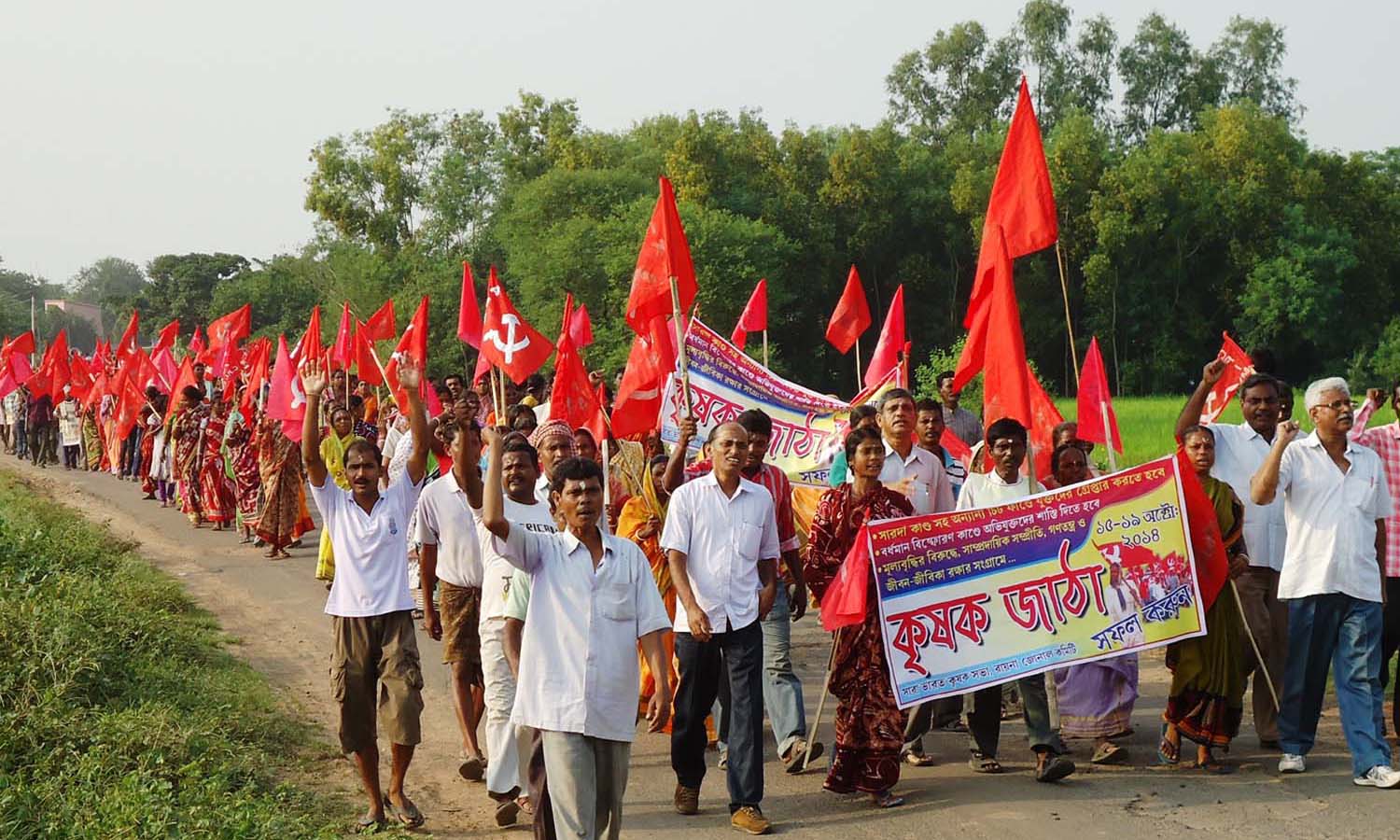
Kisan Jathas Reach 30,000 Villages in Bengal
From Our Special Correspondent in Kolkata
KISAN jathas, organised by the West Bengal Provincial Krishak Sabha (AIKS), traversed through nearly 30,000 villages for five days, interacting with people, raising burning issues and building the confidence for greater struggle in the days to come. This was a unique programme with thousands of activists of peasant movement participating and thousands others attended. On their way, the jathas braved terror, intimidation and direct attack.
The jathas started on October 15 and continued till 19th. The main idea was to raise the burning issues of rural Bengal. Peasants are not receiving remunerative prices for their produces; the procurement of paddy by the state government has fallen miserably with around half of the target being unachieved. The rural poor have not been paid their dues for working under MNREGA for months. The panchayats, under the TMC regime, have become non-functional and have turned into dens of loot. This has created a serious crisis of work in rural areas. Social security schemes, including old age pensions have been virtually stopped; benefits are being distributed by allegiance to ruling party. The jathas raised these issues along with the issue of attacks on democratic rights of the people, demanded punishment for the fraudsters in the Chit Fund scam. The peasant leaders, in their addresses, underlined the necessity of maintaining peoples’ unity in the backdrop of attempts at communal polarisation. The response of the people was very encouraging. In most areas, the common experience was that people came out of their houses or from fields and narrated their experiences. In many areas, the jathas were received with collective enthusiasm, indicating open defiance of TMC terror raj in the villages.
It was aimed to be a learning process too. AIKS leaders and activists had been advised to talk to the people extensively and learn more on the details of the situation in the villages. For this purpose, the participants stayed in the homes of the villagers, spent nights in the villages. In some places, community kitchens were organised.
Jathas were mainly organised at block levels so that it could touch as many villages as possible. For example, in West Medinipur district, 378 jathas travelled through 27 blocks. On the last day itself, there were 14 public meetings in the district. In many areas of ‘Jungle Mahal’, Krisak Jathas were practically the first open political programme by the Left activists in the last three years. Tribal people participated enthusiastically in these jathas. In Jalpaiguri, 78 jathas travelled through hundreds of kilometers in seven blocks. In North 24 Parganas, 950 jathas walked through villages in which more than 15,000 peasant activists took part. More than 250 jathas travelled in Howrah, touching 816 villages in the district. On the last day, a huge rally of workers, youth, students and women was organised in Howrah town in solidarity with the Krishak Jatha. In Birbhum, more than 300 villages were covered. Everywhere, local demands were added in the course of the journey.
The jathas faced attacks in many places. In East Medinipur, the attack was most ferocious. In Patashpur, an armed gang of TMC activists attacked the jatha and assaulted the participants. State vice president of AIKS Tarun Roy and 15 others were injured in the attack. Roy suffered a head injury and was admitted in hospital. There was immediate protest and people cordoned Patashpur police station demanding arrest of the culprits. Another jatha was attacked in Mugberia, in the same district, on the next day. But in this case, villagers, including women, came out in numbers and chased the bike-borne TMC hoodlums. They had to flee. When the police reached the spot, villagers cordoned the police vehicle. The police officers had to come to the spot and assure that the criminals would be arrested. Jathas braved attacks in Kalna, Coochbehar and continued journey despite being attacked.
Suryakanta Misra, Madan Ghosh, Nripen Chowdhury and other frontline leaders of the AIKS addressed several public meetings.
Misra, addressing rallies in West Medinipur on the last day, accused both the state and central government for violation of promises and threatened to launch bigger movements on peoples’ demands.
Summing up the experience, AIKS state president Madan Ghosh said, jathas have created a basis for further struggle in rural areas. This programme has also helped to consolidate peasant organisation.


